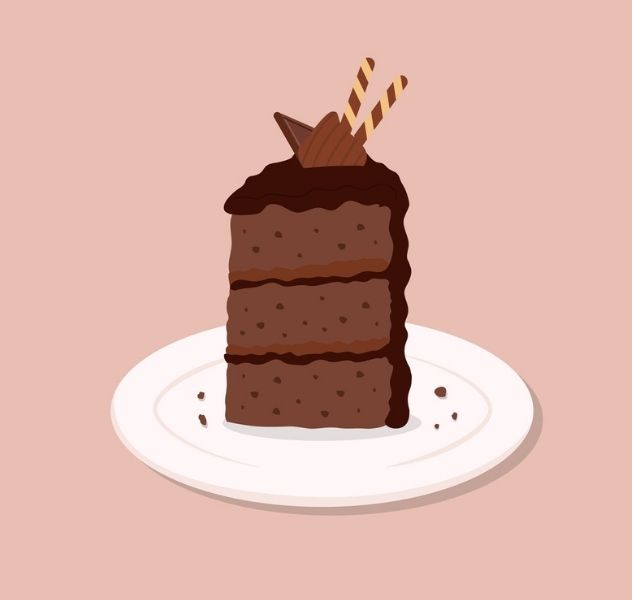Until now, my relationship with chocolate cake has been one of deep disappointment. Cake is one of life’s emollients. A slice (or two) of well-made, moist, flavoursome cake can lighten my day and soothe my wounds. Ignore the bad press cake has suffered since Marie Antoinette supposedly said, ‘Let them eat cake’. There’s plenty of evidence that, if anyone actually said this, it was long before Marie Antoinette; and, moreover, the utterer was almost certainly talking about brioche – a different matter entirely. Cake has nothing to apologise for.
Chocolate has similar beneficent properties, with the added bonus that it’s escaped the historical opprobrium associated with cake. And once I’ve started eating chocolate, it’s hard to stop. My mother never admitted that my baby’s bottle was filled with cocoa, but I cannot deny that I’ve been unable, for as long as I can remember, to resist chocolate. You’d think, then, that combining it with cake would result in something sublime. Which is where the disappointment comes in: up to now, every crumb of chocolate cake that has passed my lips has been bland in taste, with a moisture content similar to old sawdust. And yet – unless the myriad bakers and food writers who have extolled its virtues are mistaken – there must, somewhere, be a better chocolate cake.
Perhaps the let-down would have been lighter if my earliest remembered acquaintance with cake hadn’t been Swiss roll. It wasn’t that I particularly liked the cake part, about whose flavour and texture I was indifferent: as one might expect of a six-year-old, I was happy as long as there were liberal amounts of the jam filling. My mother should have settled for that. But having scored one success, she couldn’t resist attempting another: after a few weeks of the jam-filled roll, she brought out a Chocolate Swiss Roll. If either of us thought this would lead to ecstasy, the first mouthful was enough to blast any illusions. Its main feature was its aridity. Any zing of chocolate was barely perceptible, while the white filling – probably, in postwar England, more mock than cream – was entirely free of flavour. I was deeply dissatisfied, and in hindsight I believe it was this which planted the seed of my pursuit of the perfect chocolate cake.
Spanning half a lifetime or more, the search has become a quest for a low-grade holy grail. I wouldn’t want to elevate it more than that: I have no pretensions to the purity or chastity of Sir Galahad – surely one of the world’s most boring men. Nor have I any intention of dying as soon as my task has been fulfilled. Up to now, indeed, my physical wellbeing has been in no danger. Like Galahad, I have complete faith that the ideal chocolate cake – moist and saturated with flavour – exists, but I’ve never seen or tasted it. This is what has driven me on, so far in vain.
I’m more discriminating than I once was. There was a time when I seized every possible opportunity to eat chocolate cake, but I encountered so many re-runs of the Chocolate Swiss Roll Syndrome that now I seldom take the risk. Kindly but misguided friends occasionally bring us their homemade chocolate cakes, which carry with them the added hazard that, instead of the frugal slice served in a café, you’re expected to consume the whole thing. Our daughter created a chocolate cake for her children’s third birthday – partly, I suspect, because she knew that I would be at the party and felt sorry for me. Its runny pink icing didn’t get it off to a good start. It turned out to have (in her words) the texture of a day-old ciabatta loaf and tasted like cinders. Good to know I’m not alone.
I’ve never given up hope. But after many frustrating years, faced with the growing fear that the cake I want may be unattainable, I’ve concluded that I’ll have to make it myself. You may wonder why I didn’t consider this earlier. It was simply that my cake-baking history is, to put it in its best light, patchy. It doesn’t inspire confidence. So I’m well aware of my limitations, and of the risk – perhaps the near-certainty – of disaster. However, my parents instilled in me that peculiarly British philosophy personified by Scott of the Antarctic – success is all very fine, but glorious failure is even better. And the twin incentives of desperation and hubris have no doubt played a part.
I’ve approached the task by careful stages. To begin, I’ve carried out extensive recipe research over many weeks before selecting the one which, I feel, fits my specifications while minimising the risk of embarrassing me. Having then gotten in all the ingredients, I’ve taken ample time to prepare myself both psychologically and physically. While not going as far as to start practising yoga or transcendental meditation, I consider it essential to build up a high level of determination, leavened with a soupçon of humility – not to say trepidation – as prophylaxis against overconfidence. I’ve eschewed weight training, but I have exercised regularly and been for long, solitary walks. And I’ve performed numerous elaborate calculations to enable me to allow for and overcome the vagaries of our oven. Finally, I’ve set aside a full day in my diary, to ensure that I don’t blunder under time pressure.
Now Cake Day has at last arrived, I’m as ready as I can be. And yet, as I assemble the flour, the cocoa, the chocolate, the eggs and all the other ingredients on our black granite benchtop and haul the utensils from their drawers and cupboards, the top of my head begins to perspire and I feel distinctly queasy. It would be easy to stop and declare the task beyond me. But baking a cake is like getting on your feet in court – however nervous you are before you begin, you have to master your apprehensions, hoping that once you’re underway, they will vanish.
To make sure there’s no going back, I break the first egg into a bowl. While I work, I re-read the recipe several times in case I’ve omitted an ingredient or overlooked a step in the process. Should I ensure an adequate level of flavour by adding more chocolate to the recipe, I wonder? Better not … that might create unforeseen side effects.
I continue to beat, sift and stir. The oven is at the correct temperature. Before I decant the mixture into my well-greased and lined baking tin, I check one last time that nothing has been left out. The nascent cake looks satisfyingly chocolatey, and what’s left over after scraping out the mixing bowl tastes promising. I’m starting to feel pleased at my own cleverness. Perhaps this will be The Chocolate Cake. I thrust the tin into the oven and shut the door behind it. With a song in my heart and a smile playing on my lips, I set the timer and wait.
Some 40 minutes later, I deliver my first-born chocolate cake. My family are on hand for its arrival in the world. It has, so to speak, risen to the occasion. We all agree that we’ve seldom seen so bonny-looking a young cake, chocolate or otherwise. There is, of course, an intermission while it cools and readies itself for icing.
I hand each of them a slice, and wait. They bite, chew, swallow. Silence. No yums. No lip-smacking. No applause. My daughter looks at the ceiling.
Silence.
“Well?” I say.
After a further pause, she says, “You’d better have some.”
It’s hard to find words that fairly reflect my impression of that first bite. As near as I can express it, it has the taste and texture of granulated cardboard. I’ve been unsparing in my criticisms of other people’s chocolate cakes, but this is something far worse. I need a glass of water before I can swallow it and speak.
“It’s not that good, I admit.” I like to let myself down lightly, but I have no excuses this time. “Maybe we could use it for trifle,” I say.
“No, Dad, not even trifle would save it.”
“Why not? If we poured brandy over it, at least it wouldn’t be so dry.”
“Waste of brandy. If you need a drink that badly, just pour yourself one and forget the cake.”
Pouring the drink is the easy part.
Despite this debacle, there is still one more chance – and a good one. Which is one reason why, six months later, we are in the café of the Hotel Sacher in Vienna. It’s been a long journey. Forty years and 25,000 miles. London to New Zealand and –almost – back again.
For this is the home of Sachertorte – the iced chocolate cake which, they say, the young apprentice Franz Sacher invented in 1832 for the Austrian chancellor, Prince Metternich.
The café itself – red brocade wallpaper and red carpet, with little marble-topped tables arranged in perfect geometry – looks so Viennese. But my ear tells me something different. Few of the voices I can hear from nearby tables sound German: there’s English and American (which accounts for our table and a couple of others), and someone behind me is speaking Italian. On the far side of the room, out of earshot, a young man is gesticulating vigorously, so we guess he’s French. We’re all trying to avoid looking like tourists, but we’re not fooling anyone except ourselves.
Our small party, just off the tour bus, is here for the history, the atmosphere and the cake – but mainly the cake. Although it’s mid-afternoon, the place isn’t particularly busy. The waiters, formal in black and white, seem less than fully occupied and, if it weren’t for the significance of the occasion, we’d be getting impatient with the time it’s taking to attract their attention.
At length, one detaches himself from a group near the door, and strolls towards us. He looks vaguely military: tall, thin-lipped, unsmiling. The unbidden thought flits through my mind that, in another era, he might have looked well in jackboots. He stops at my elbow but there’s no clicking of heels. He inclines his head almost imperceptibly, as if he’s doing us a favour by allowing us to visit his establishment. I order for the four of us, using roughly half of my total German vocabulary: “Sachertorte für vier, bitte.” The waiter, with the merest tinge of an accent, replies, “Very good. And coffee also?” This leads to a further discussion which I have to continue in English, abandoning any remaining pretence that I’m not a tourist.
Metternich, once the most powerful statesman in Europe, was also a man of great discrimination. If he wanted soft, moist, chocolate-laden cake, he would have made sure of getting it. And Sachertorte, created specially for him, is perhaps the world’s most famous chocolate cake. What was good enough for Metternich is good enough for me. So I’m confident that what we’re about to sample will put everything right at last. Although that waiter’s taking his time, I don’t mind. It’ll be worth it.
The cake, when it finally appears, fully justifies its pin-up photos. Each slice comes on a white plate, edged in red and gold, and is set off by a rosette of whipped cream. The icing is smooth and even, and bears an embossed chocolate circle surrounding the legend, ‘Hotel Sacher Wien’. Perfect.
We lift our forks and begin. In silence, we walk back along Kärntnerstrasse towards St Stephen’s Cathedral. We’re almost there when someone says, “At least the icing was okay, even if the cake was stale. What did you all think?”
“What I don’t understand,” comes the answer, “is how Sacher kept his job, and why Metternich didn’t fire him while he had the chance. Might’ve saved us a journey.”
Maybe it’s time for me to give this up. I could always try stamp collecting instead.
There’s a minor consolation. One day, the compilers of Guinness World Records will call for entries for the World’s Greatest Disappointment. Mine’s ready.
About the Author
Born in London during World War II, Roger Chapman counts himself lucky to have survived the twin hazards of wartime rationing and postwar British food. Luckily, his parents’ decision to emigrate to New Zealand in the 1950s saved him from lifelong indigestion. After 45 years practising law in Wellington, he abandoned the courtroom for the kitchen: for the past 10 years he’s struggled unsuccessfully to improve his cooking and combat the malice of his kitchen appliances. He also writes a blog in which he documents his numerous culinary debacles.







